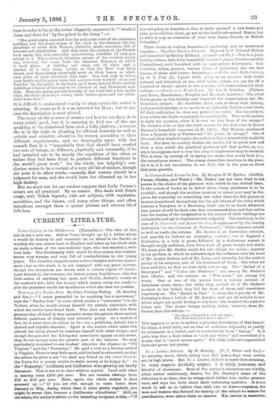In Cornwall and Across the Sea. By Douglas B. W.
Sladen. (Griffith, Ferran, Okeden, and Welsh.)—Mr. Sladen has not been kind to .his poems in the choice of the garment with which he has clothed them. In the covers of books, as in ladies' dress, cheap gaudiness is to be avoided ; and though the anxious amateur or minor poet may be for- given for venturing on something less sober than the dull greens or browns (unrelieved by anything but the gilt letters of the title) which content a Tennyson or a Browning, there can be no doubt whatever that poems should be their own best recommendation, and that sallies into the realms of the imagination in the matter of cloth bindings are undesirable and apt to degenerate into vulgarity. This tendency, in the case of In Cornwall and Across the Sea, is aggravated by the staring dedication "to the Countess of Portsmouth," which appears outside as well as inside the volume. Mr. Sladen is an Australian colonist, and possibly he follows an Australian custom ; but in England a dedication to a lady in prose, followed by a dedicatory sonnet, is thought amply sufficient, even for a work of great weight and merit. We must give Mr. Sladen credit for two things we notice : honesty in his preface, in which he acknowledges the influence over his muse of Mr. Austin Dobson and of Mr. Lang ; and secondly, for the perfect polity of his subjects, and of his treatment of them. But when we have said this, we fear we have little else to say. The "Ballad of a Graveyard" and "Under the Mistletoe" are among Mr. Sladen's best efforts ; and the sonnets on " Wife-Love " are among his worst. One or two of the poems have a certain amount of daintiness about them ; but while they remind us of Mr. Sladen's masters in the ballad, they fall far short of them, and sometimes hopelessly so. The "Ballad on Pain" is more like a parody of Mr. Calverley'a than a ballade of Mr. Lang's ; and yet its subject is one which might stir poetic feeling in any man—the death of the author's infant son. The theme wrings nothing better, however, from Mr. Sladen than this refrain :— "For there I found him stiff and white, The Babe who never moved again."
This appears to us to be neither a pleasing description of thabbeauti- fal thing, a dead child, nor an idea of sufficient originality to justify its reiteration in a ballad, and its resuscitation in an "Envoy." It is quite tree that a dead infant is "stiff and white," and somewhat of a truism that it "never moves again." But tliese bald and =garnished facts are prose, not poetry.










































 Previous page
Previous page